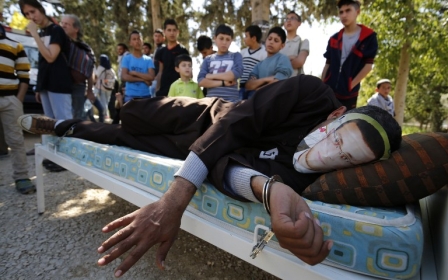Death of Palestinian exile in Bulgaria shrouded in mystery

Hours after Palestinian citizen Omar Zayed was found dead in the Palestinian embassy in Sofia, Bulgaria, the circumstances surrounding his death remain unclear.
“All we want to say now is that what happened was a betrayal,” Zayed’s 19-year-old son Mohamed told Middle East Eye. Overcome by emotion, Mohamed said he could not say anything else.
Earlier in the day, the Palestinian ambassador to Sofia, Ahmad al-Madbouh, told Bulgarian media he suspected murder.
“Israeli persecution resulted in his murder […] So far we believe that those who were persecuting him might have done something against him. That’s why we are waiting for the results of the investigation,” said Madbouh.
But others are being less quick to point out foul play. According to Zayed’s lawyer, Omar Muslah, his death was an accident. He said that he visited the embassy after Zayed’s body was removed, saw the blood stains and talked to embassy staff.
“I think he probably went up to the upper floors of the embassy, he probably bent over and, by accident, fell,” said Muslah in an interview for the Middle East Eye.
He explained that Zayed had been living in a small room in the embassy since late December, when he went into hiding after being informed that Israel was seeking his extradition. Muslah said that embassy employees had seen him the day before and had talked to him; there was nothing unusual about his behaviour.
Muslah said he last talked to his client on Monday when they discussed details about his case. The lawyer said his client was a bit stressed.
Zayed was found with what has been described as bloody, violent injuries in the garden of the Palestinian embassy on Friday morning.
General Prosecutor Sotir Tsartsarov said that a call to the national emergency number was received at 7:32 am and an ambulance was dispatched immediately. When the emergency team arrived at the Palestinian embassy, Zayed was still alive. Tsartsarove said that there a number of ideas on the cause of death, including a fall from a high place.
According to Tsartsarov, the embassy had neither physical security nor video surveillance.
Palestianian ambassador Madbouh pointed out that the Bulgarian state has not provided security for the embassy for the past seven years, despite repeated requests.
Zayed was reluctant to surrender to Bulgarian authorities, fearing that the Bulgarian court would rule in favour of Israel’s request, his lawyer said.
Muslah was preparing his defence based on the argument that Zayed was a political prisoner and therefore the European convention on extradition would not apply to his case.
Israel claims that Zayed murdered a yeshiva (religious) student in Jerusalem in 1986. The 52-year-old from Jenin in the occupied West Bank had been living in Bulgaria since 1994 following his escape from a Bethlehem hospital in 1990, where he had been receiving treatment for problems caused by a 40-day hunger strike against his sentence.
Zayed denies committing murder and had said that he was tortured into confessing by Israeli authorities.
Just before Zayed’s death, he had received documents from the Palestinian Authority showing that, after his imprisonment in 1986, the Israeli authorities expelled his family from their house in Jenin and demolished the room he was living in – a treatment reserved only for Palestinian political prisoners in Israel.
Zayed was a member of the Popular Front for the Liberation of Palestine (PFLP). The group condemned his killing and accused the Israeli's of carrying out his "assassination".
Muslah denied reports in foreign media that in January Zayed was given three days to surrender to the Bulgarian authorities.
The Bulgarian National TV quoted the Bulgarian PM Boyko Borisov as saying that during his visit this week to Israel and Palestine, both sides had raised the question of Zayed’s extradition. He said he had responded that Zayed’s case has to go through the legal process.
Stay informed with MEE's newsletters
Sign up to get the latest alerts, insights and analysis, starting with Turkey Unpacked
Middle East Eye delivers independent and unrivalled coverage and analysis of the Middle East, North Africa and beyond. To learn more about republishing this content and the associated fees, please fill out this form. More about MEE can be found here.




